Non-compliant vehicle tuning can lead to serious legal and financial risks. If you tamper with emission controls or bypass regulations, you could face hefty fines, vehicle impoundment, or even criminal charges. It may cause your vehicle to fail inspections, void your insurance, or result in legal actions by authorities. Keeping your modifications legal safeguards you from these issues and ensures your vehicle remains roadworthy—if you want to explore how to stay within legal limits, keep going.
Key Takeaways
- Tampering with emission control devices can result in hefty fines and vehicle registration issues.
- Illegal modifications breach environmental laws, leading to fines, vehicle impoundment, and potential criminal charges.
- Non-compliant tuning may cause vehicle inspection failures, resulting in legal penalties and the need to restore original systems.
- Altered vehicles risk being seized or impounded, with possible legal consequences for emissions violations.
- Lack of proper certification can void insurance coverage and increase liability in case of accidents or damages.
Understanding Vehicle Emission Regulations

Understanding vehicle emission regulations is essential because these rules directly impact how you can modify your vehicle. You need to know what emissions standards apply in your area and how they affect aftermarket modifications. Many regions require vehicles to meet specific emissions levels to be street legal. You might also need to be aware of the testing procedures used during emissions inspections, as these can vary by jurisdiction. Failing to adhere can lead to fines, failed inspections, or even vehicle impoundment. Regulations are typically enforced through emissions testing and inspections, so you should always verify what’s permitted before making changes. Staying informed helps you avoid legal trouble and ensures your vehicle remains compliant with current environmental standards. Ignorance of these rules won’t protect you from penalties if your modifications violate emission laws. Additionally, understanding the emissions testing process can help you prepare for inspections and maintain compliance. Being aware of emissions standards can also guide you in selecting legal modifications that won’t jeopardize your vehicle’s legality. For example, understanding how emission control devices function can help you keep your vehicle compliant while tuning.
Legal Limits on Software and Hardware Modifications
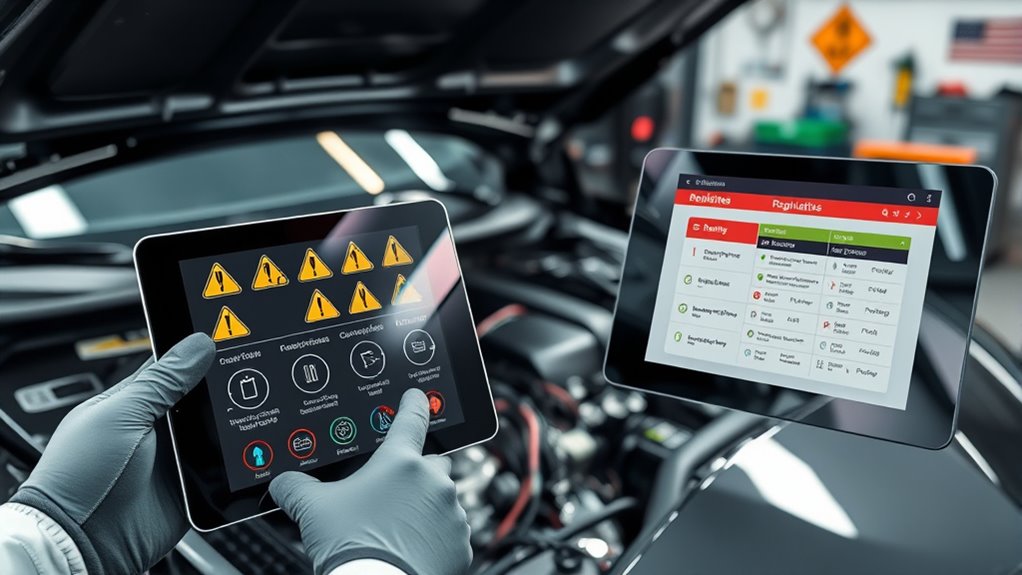
Modifying your vehicle’s software and hardware can quickly cross legal boundaries if you’re not aware of the limits. Many countries have strict laws governing what changes are permitted without requiring certification or approval.
For instance, altering the engine control unit (ECU) to boost performance might be legal in some regions, but it can violate emissions standards or safety regulations elsewhere. Hardware modifications, like installing aftermarket parts, are also regulated, especially if they impact safety or emissions. Additionally, some jurisdictions require you to notify authorities or get approval before making significant changes. Ignoring these limits risks fines, vehicle inspection failures, or even invalidating your insurance. Moreover, understanding the legal framework surrounding vehicle modifications is crucial to avoid unintended violations. It is also important to consider public safety regulations, which aim to protect all road users from potentially hazardous modifications. Staying informed about emissions regulations can help ensure your modifications remain compliant and environmentally responsible. Furthermore, being aware of state-specific laws can prevent inadvertent non-compliance. Always research your local laws and consult professionals to ensure your modifications stay within legal boundaries.
The Risks of Removing or Altering Emission Control Devices
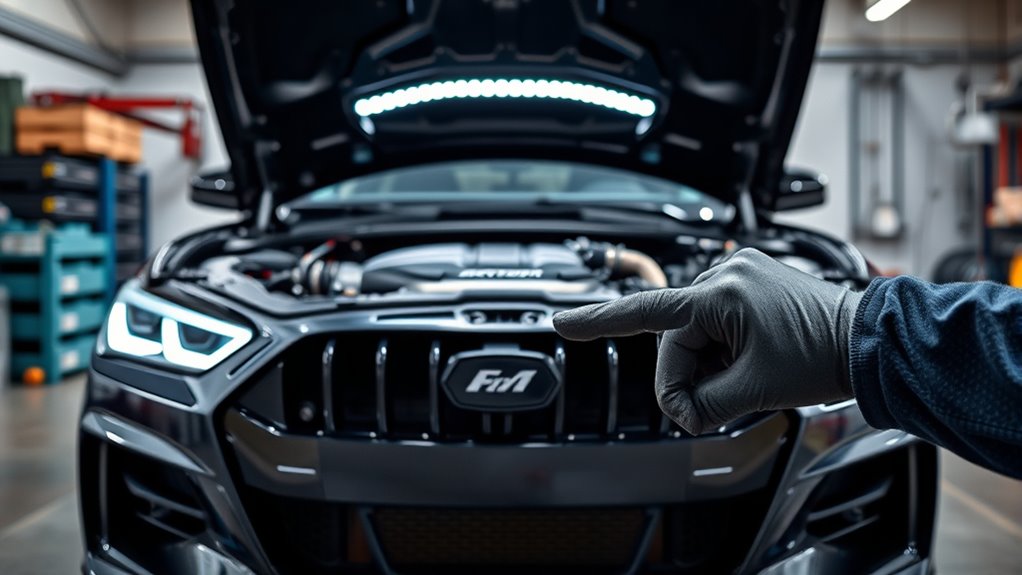
Removing or altering emission control devices can lead to serious legal penalties and hefty fines. You also risk violating environmental regulations, which could result in costly consequences. Additionally, your vehicle might fail inspection, making it illegal to drive on public roads. Ignoring these regulations can also increase the likelihood of attracting cybersecurity vulnerabilities, especially if vehicle systems are tampered with or exposed to hacking. Moreover, non-compliance can undermine vehicle safety standards, putting drivers and passengers at risk. Failing to adhere to these regulations can also lead to increased regulatory compliance risks, which may involve legal actions or sanctions. Implementing AI in Business solutions can help ensure adherence to these standards through automated compliance monitoring. Understanding the importance of emission standards is crucial for maintaining legal compliance and protecting the environment.
Legal Penalties and Fines
Tampering with or removing emission control devices can lead to significant legal penalties, including hefty fines and vehicle registration issues. Authorities often impose substantial fines for non-compliance, which can range from hundreds to thousands of dollars, depending on your location and the severity of the offense. Additionally, non-compliance with emission standards may result in quality issues with your vehicle’s performance and longevity. Your vehicle may also be deemed illegal to operate on public roads, resulting in registration suspension or revocation. If caught, you could face court hearings, increased insurance premiums, and potential vehicle impoundment. These penalties are designed to discourage unauthorized modifications and ensure compliance with environmental laws. Understanding the regulations surrounding emission control is essential to avoid inadvertent violations and penalties. Ignoring these rules not only risks financial loss but also legal trouble, so it’s essential to understand the consequences of non-compliance before making any modifications to your vehicle’s emission systems. Being aware of the vehicle emission laws can help you stay compliant and avoid costly legal issues. Moreover, advancements in automotive regulations highlight the importance of adhering to legal standards to prevent future penalties.
Environmental Regulation Violations
Alterting or disabling emission control devices can lead to serious violations of environmental regulations. When you remove or alter components like catalytic converters or particulate filters, you’re bypassing laws designed to limit harmful pollutants released into the air.
Regulatory agencies, such as the EPA, strictly prohibit tampering with emission systems, and doing so can result in hefty fines and legal action. These violations contribute to increased air pollution, harming public health and the environment.
Even if your vehicle passes inspection, illegal modifications remain punishable under federal and state laws. It’s essential to understand that non-compliant tuning not only risks legal penalties but also undermines efforts to reduce environmental impact.
Staying within legal limits protects both your finances and the planet.
Impact on Vehicle Inspection
Have you considered how modifying your vehicle’s emissions system can affect your ability to pass inspection? Removing or altering emission control devices often results in your vehicle failing mandatory inspections.
Many jurisdictions require vehicles to meet specific emissions standards, and tampering with these systems can lead to detection during testing. If inspectors notice missing or altered components, your vehicle may be deemed non-compliant, leading to failed inspections and potential fines. Additionally, emission control devices are designed to help vehicles meet environmental regulations, and bypassing them can have broader ecological impacts.
In some cases, authorities may require you to restore the original emission systems before approval. Not passing inspection can also prevent you from renewing your registration or obtaining necessary permits. Furthermore, vehicle modification laws aim to regulate alterations that impact safety and environmental standards, and non-compliance can result in legal consequences.
Ignoring these regulations can also lead to legal penalties, which might include court summons or additional sanctions. Ultimately, tampering with emission controls jeopardizes your vehicle’s legal status and can lead to costly penalties.
Consequences of Unauthorized ECU Reprogramming
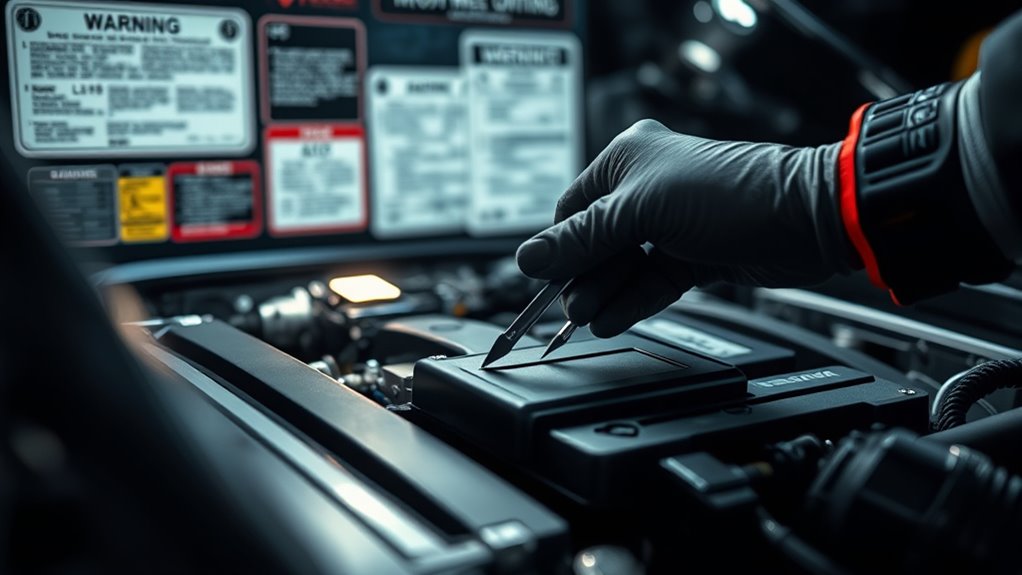
Unauthorized ECU reprogramming can lead to serious legal and financial consequences. If you modify your vehicle’s ECU without proper approval, authorities may view it as a violation of emissions or safety regulations. This can result in hefty fines, vehicle impoundment, or even criminal charges depending on your jurisdiction. Improper tuning may also violate safety standards established for vehicle operation, increasing the risk of accidents or road hazards. In addition, the complexity of airless paint sprayer technology means that improper modifications can cause malfunctions that compromise safety and performance. These malfunctions might also lead to costly repairs, further emphasizing the risks involved. Insurance companies might refuse to cover damages if they find unauthorized modifications, leaving you financially vulnerable after an accident. Additionally, non-compliant tuning can void your vehicle’s warranty, forcing you to pay for repairs out of pocket. You also risk legal action if your vehicle fails emissions tests or is deemed unsafe on the road. Overall, unauthorized ECU reprogramming exposes you to significant legal risks that can affect your finances, driving privileges, and peace of mind.
Impact of Tuning on Roadworthiness and Safety Compliance
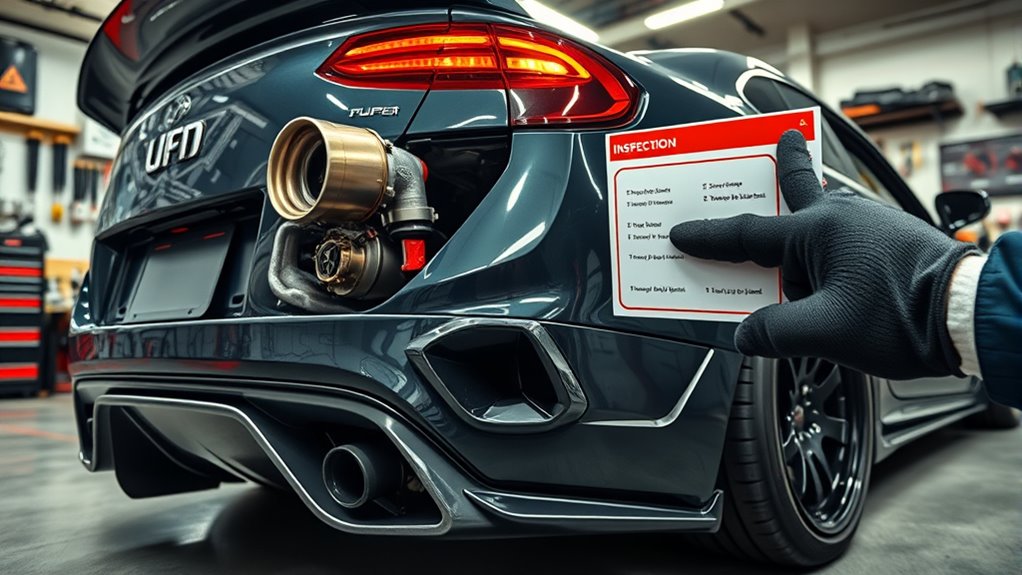
Tuning your vehicle can considerably affect its roadworthiness and compliance with safety standards. When you modify engine settings or exhaust systems without proper checks, you risk making your vehicle unsafe to drive. These changes can lead to increased emissions, reduced braking efficiency, or compromised stability, all of which threaten safety.
If your modifications cause the vehicle to fall out of legal compliance, authorities may deem it unfit for road use. Ignoring safety standards can also result in failed inspections or citations.
Ultimately, improper tuning can jeopardize your ability to legally operate your vehicle, increasing the chance of accidents, fines, or legal action. Ensuring your modifications meet safety and regulatory requirements is vital for avoiding these risks.
State and Federal Enforcement Actions and Penalties

State and federal agencies actively monitor vehicle tuning for compliance. Violations can lead to serious enforcement actions.
You could face hefty fines, penalties, and even legal charges if your modifications violate regulations.
Understanding these enforcement risks helps you stay compliant and avoid costly consequences.
Regulatory Compliance Risks
Have you considered the serious consequences of failing to comply with federal and state regulations on vehicle modifications? If your tuning doesn’t meet legal standards, enforcement agencies can take action against you.
Federal agencies like the EPA monitor emissions-related modifications, and violations can lead to investigations and sanctions. State authorities focus on safety and noise regulations, and non-compliance can trigger inspections or audits.
Even if you’re not intentionally breaking rules, unapproved modifications may attract scrutiny. Regulatory compliance risks include the possibility of your vehicle being deemed illegal for street use, which could result in orders to revert to stock or face legal consequences.
Staying informed about applicable laws helps you avoid costly enforcement actions and ensures your vehicle remains compliant with all relevant regulations.
Penalties and Fines
Failing to comply with vehicle modification laws can lead to significant penalties and fines, enforceable by both federal and state authorities. If you bypass emissions controls or alter your vehicle’s exhaust system illegally, you risk hefty fines that can reach thousands of dollars.
Additionally, authorities may impose penalties such as license suspension or vehicle impoundment. These fines are meant to deter illegal modifications, but they can quickly add up if you’re caught multiple times.
In some cases, violations may lead to increased insurance premiums or even criminal charges, depending on the severity of the infraction. Staying within legal limits helps you avoid these costly consequences and keeps your vehicle compliant with the law.
Ignoring regulations puts you at serious financial risk.
Enforcement Agency Actions
Enforcement agencies at both the state and federal levels actively monitor and penalize illegal vehicle modifications, including non-compliant tuning. They use inspections, traffic stops, and advanced technology to detect illegal emissions modifications and unauthorized performance upgrades.
When you’re caught, agencies can issue citations, seize vehicles, and impose hefty fines. Federal agencies like the EPA may pursue criminal charges if your tuning violates emission standards, leading to severe penalties.
State authorities can also revoke registration or driver’s licenses, making it harder to operate your vehicle legally. In many cases, enforcement actions escalate quickly, especially if you’ve previously been warned or fined.
Staying compliant with laws helps you avoid these enforcement actions and the consequences that come with non-compliance.
Vehicle Inspection and Certification Challenges

Because vehicle modifications can complicate inspection and certification processes, staying compliant with regulatory standards is vital. When authorities review your vehicle, non-compliant modifications can lead to rejection or costly rework. You might face delays, fines, or even vehicle impoundment if your vehicle doesn’t meet safety and emissions standards. To navigate these challenges, understanding the certification process is essential. Here’s a quick overview:
| Modification Type | Inspection Impact | Certification Requirement |
|---|---|---|
| Engine Tuning | May alter emissions output | Must meet emissions standards |
| Suspension Adjustments | Affects safety and ride quality | Needs safety inspection |
| Exhaust System Changes | Impacts noise and emissions | Requires proper certification |
Stay informed to avoid legal issues and ensure your vehicle remains compliant.
Insurance Implications of Non-Compliant Tuning

When your vehicle isn’t properly certified after modifications, your insurance coverage can become complicated. Many policies require that any tuning or upgrades meet legal standards; if they don’t, your insurer might deny claims or refuse coverage entirely.
In an accident, you could be held responsible for damages, with your insurer refusing to pay out because of non-compliance. Some insurers include clauses that specify coverage is void if the vehicle has unapproved modifications.
Additionally, if you’re involved in a legal dispute, proof of proper certification can be vital. Failing to meet legal requirements not only risks losing coverage but also exposes you to potential fines and legal action.
Staying compliant ensures your insurance remains valid, protecting you financially in case of accidents or damages.
Potential for Vehicle Seizure and Legal Prosecution

Failing to comply with legal standards for vehicle modifications can lead to your car being seized by authorities. Law enforcement actively monitors and enforces regulations against illegal tuning, especially when it impacts safety or emissions.
If caught, your vehicle may be impounded, and you could face hefty fines or legal charges. In some cases, authorities might pursue prosecution for violations such as tampering with emissions systems or exceeding noise limits.
This not only results in the loss of your vehicle but also creates a criminal record that could affect your future licensing or legal standing. Non-compliance puts you at serious risk of legal action, emphasizing the importance of understanding and adhering to all relevant laws to avoid losing your vehicle or facing prosecution.
Best Practices for Staying Within Legal Boundaries
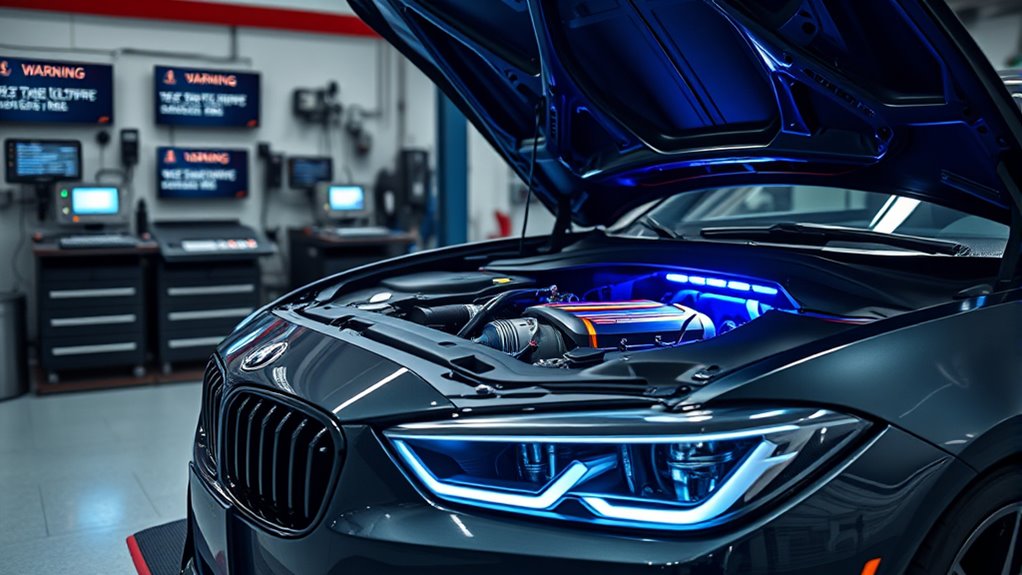
To stay within legal boundaries when modifying your vehicle, it’s essential to stay informed about local laws and regulations. Regularly check guidelines from your state’s DMV or transportation authority. Consult professional tuners who understand legal limits to ensure your modifications comply. Keep detailed records of all work performed, including parts and certifications, in case you face inspections or questions.
| Step | Action | Benefit |
|---|---|---|
| Research regulations | Know what modifications are permitted | Avoid fines and penalties |
| Use certified parts | Select legal, approved components | Ensure compliance and safety |
| Hire qualified experts | Work with experienced technicians | Minimize legal risks and errors |
Staying proactive saves you from legal trouble and keeps your vehicle street-legal.
Frequently Asked Questions
Can Non-Compliant Tuning Void My Vehicle Warranty?
When you tune your vehicle non-compliantly, you risk voiding your warranty. Manufacturers often specify that modifications outside approved parameters can nullify coverage, especially if the tune causes issues.
If your vehicle develops problems related to the tuning, the manufacturer might deny warranty claims.
To avoid losing your warranty benefits, always check your manufacturer’s policies and consider compliant tuning options that keep your coverage intact.
Are There Legal Differences Between States Regarding Tuning Laws?
You should know that tuning laws vary by state, so what’s legal in one place mightn’t be permissible in another. Some states have strict emissions and noise regulations, making certain modifications illegal.
You’re responsible for understanding your local laws before tuning your vehicle. Failing to comply can lead to fines, penalties, or even your vehicle being impounded.
Always check with local authorities or a legal expert to ensure you’re within the law.
How Does Non-Compliance Affect My Vehicle’S Resale Value?
Think of your vehicle’s resale value as a fragile vase—you want to keep it pristine. When you ignore tuning laws, you risk devaluing your car, making it less attractive to buyers.
Non-compliance can raise red flags during inspections, limiting your market. Ultimately, your vehicle might fetch a lower price, as savvy buyers steer clear of potential legal issues and modifications that don’t meet standards, diminishing its worth.
What Are the Privacy Implications of ECU Reprogramming?
When you reprogram your ECU, you might face privacy issues because some tuning companies collect and store your vehicle data.
This data can include your driving habits, location, and performance details. If it’s shared or sold without your consent, your privacy is jeopardized.
You should carefully review the tuning provider’s policies and ensure they prioritize data security, so your personal information stays protected.
Is Online Tuning Software Legally Approved for Street Use?
You’re curious if online tuning software is street-legal. The truth is, legality varies by location and the software’s compliance with local emissions and safety standards.
While some software claims to be approved, many aren’t officially certified for street use, risking hefty fines or vehicle confiscation.
Always research your area’s regulations and opt for reputable, certified tuning solutions to stay on the right side of the law.
Conclusion
So, think tuning your car is just a harmless hobby? Think again. Ignoring emission laws might boost your horsepower, but it’ll also boost your chances of hefty fines, vehicle seizures, or even jail time. All those illegal tweaks could turn your dream ride into a legal nightmare faster than you can say “inspection failure.” Play it safe, stay compliant, and keep your car on the road—not in the courtroom. After all, who needs a speeding ticket when you can have a court date?









